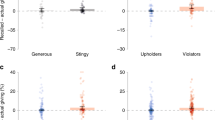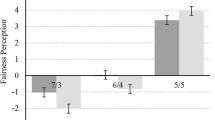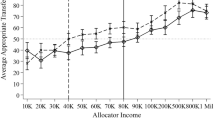Abstract
This paper focuses on how people think about their own and other's reactions to being overpaid. Two experiments investigate the discrepancy between people's own satisfaction and their perception of other's satisfaction with overpayment. The results of both experiments support our hypothesis that people think others are more satisfied with being overpaid than they are themselves. Our results are consistent with the idea that people think others are more influenced by egoism-based considerations whereas they themselves are more influenced by considerations of right and wrong. In other words, people show a moral superiority effect. In the general discussion, we argue why it is less likely to find moral superiority effects on people's reactions to being equally paid and underpaid, and we relate our findings to the literature of self-serving biases.
Similar content being viewed by others
REFERENCES
Adams, J. S. (1965). Inequity in social exchange. In Berkowitz, L. (ed.), Advances in Experimental Social Psychology, Vol. 2, Academic Press, New York, pp. 267–299.
Austin, W., McGinn, N. C., and Susmilch, C. (1980). Internal standards revisited: Effects of social comparisons and expectancies on judgments of fairness and satisfaction. J. Exp. Soc. Psychol. 16: 426–441.
Austin, W., and Walster, E. (1974). Reactions to confirmations and disconfirmations of expectancies of equity and inequity. J. Pers. Soc. Psychol. 30: 208–216.
Beauchamp, T. L. (2001). Philosophical Ethics: An Introduction to Moral Philosophy, 3rd edn., McGraw-Hill, Boston.
Boles, T. L., and Messick, D. M. (1995). A reverse outcome bias: The influence of multiple reference points on the evaluation of outcomes and decisions. Organ. Behav. Hum. Decis. Process. 61: 262–275.
Buunk, B. P., and Van Yperen, N. W. (1989). Social comparison, equality, and relation-ship satisfaction: Gender differences over a ten-year period. Soc. Justice Res. 3: 157–180.
Cates, K. L., and Messick, D. M. (1996). Frequentistic adverbs as measures of egocentric biases. Eur. J. Soc. Psychol. 26: 155–161.
Cohen, R. L. (1986). Justice: Views From the Social Sciences,Plenum, NewYork.
Epley, N., and Dunning, D. (2000). Feeling "holier than thou": Are self-serving assessments produced by errors in self-or social prediction? J. Pers. Soc. Psychol. 79: 861–875.
Haidt, J. (2000). The moral emotions. In Davidson, R. J., Scherer, K., and Goldsmith, H. H. (eds.), Handbook of Affective Sciences, Oxford: Oxford Press.
Hobbes, T. (1651/1904). Leviathan, or Matter, Forme and Power of a Commonwealth Ecclesiasticall and Civill, Cambridge University Press, Cambridge.
Jencks, C. (1990). Varieties of altruism. In Mansbridge, J. J. (ed.), Beyond Self-Interest, The University of Chicago Press, Chicago.
Kahneman, D., Diener, E., and Schwarz, N. (1999). Well-Being: The Foundations of Hedonic Psychology, Russell Sage Foundation, New York.
Kirk, R. E. (1982). Experimental Design: Procedures for the Behavioral Sciences (2nd ed.), Brooks/Cole, Belmont, CA.
Liebrand, W. B. G., Messick, D. M., and Wolters, F. J. M. (1986). Why are we fairer than others: A cross-cultural replication and extension. J. Exp. Soc. Psychol. 22: 590–604.
Loewenstein, G. F., Thompson, L., and Bazerman, M. H. (1989). Social utility and decision making in interpersonal contexts. J. Pers. Soc. Psychol. 57(3): 426–441.
Messick, D. M. (1993). Equality as a decision heuristic. In Mellers, B. A., and Baron, J. (eds.), Psychological Perspectives on Justice: Theory and Applications, Cambridge University Press, New York, pp. 11–31.
Messick. D. M., Bloom, S., Boldizar, J. P., and Samuelson, C. D. (1985). Why we are fairer than others. J. Exp. Soc. Psychol. 21: 480–500.
Messick, D. M., and Sentis, K. P. (1983). Fairness, preference, and fairness biases. In Messick, D. M. and Cook, K. S. (eds.), Equity Theory: Psychological and Sociological Perspectives,Praeger, New York, pp. 61–94.
Messick, D. M., and Sentis, K. P. (1985). Estimating social and nonsocial utility functions from ordinal data. Eur. J. Soc. Psychol. 15(4): 389–399.
Miller, D. T. (1999). The norm of self-interest. Am. Psychol. 54(12): 1053–1060.
Miller, D. T., and Ratner, R. K. (1998). The disparity between the actual and assumed power of self-interest. J. Pers. Soc. Psychol. 74: 53–62.
Mischel, W., Ebbesen, E. B., and Zeiss, A. M. (1976). Determinants of selective memory about the self. J. Consult. Clin. Psychol. 44: 92–103.
Montada, L. (2002). Doing justice to the justice motive. In Ross, M., and Miller, D. T. (eds.), The Justice Motive in Everyday Life, Cambridge University Press, New York.
Montada, L., Schmitt, M., and Dalbert, C. (1986). Thinking about justice and dealing with one's own privileges. In Bierhoff, H. W. Cohen, R. L., and Greenberg, J. (eds.), Justice in Social Relations. Plenum Press, New York.
Moore, L. M., and Baron, R. M. (1973). Effects of wage inequities on work attitudes and performance. J. Exp. Soc. Psychol. 9: 1–16.
Nisbett, R., and Ross, L. (1980). Human Inference: Strategies and Shortcomings of Social Judgment, Prentice-Hall, Englewood Cliffs, NJ.
Smith, E. R., and Mackie, D. M. (1990). Social Psychology, Worth Publishers, New York.
Van den Bos, K. (1999). What are we talking about when we talk about no-voice proce-dures? On the psychology of the fair outcome effect. J. Exp. Soc. Psychol. 35: 560–577.
Van den Bos, K., Lind, E. A., Vermunt, R., and Wilke, H. A. M. (1997). How do I judge my outcome when I do not know the outcome of others? The psychology of the fair process effect. J. Pers. Soc. Psychol. 72: 1034–1046.
Van den Bos, K., Peters, S. L., Bobocel, D. R., and Ybema, J. F. (2004). On ethical considerations and egoism-based pleasure: Reactions to advantageous inequity under cognitively busy conditions. Manuscript submitted for publication.
Van den Bos, K., Wilke, H. A. M., Lind E. A., and Vermunt, R. (1998). Evaluating outcomes by means of the fair process effect: Evidence for different processes in fairness and satisfaction judgments. J. Pers. Soc. Psychol. 74: 1493–1503.
Van Dijk, E., Wilke, H., Wilke, M., and Metman, L. (1999). What information do we use in social dilemmas? Environmental uncertainty and the employment of coordination rules. J. Exp. Soc. Psychol. 35: 109–135.
Author information
Authors and Affiliations
Rights and permissions
About this article
Cite this article
Peters, S.L., van den Bos, K. & Bobocel, D.R. The Moral Superiority Effect: Self Versus Other Differences in Satisfaction with Being Overpaid. Social Justice Research 17, 257–273 (2004). https://doi.org/10.1023/B:SORE.0000041293.24615.f7
Issue Date:
DOI: https://doi.org/10.1023/B:SORE.0000041293.24615.f7




